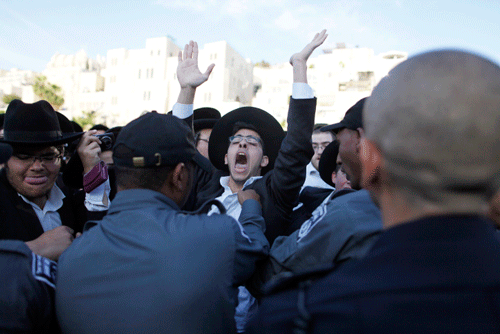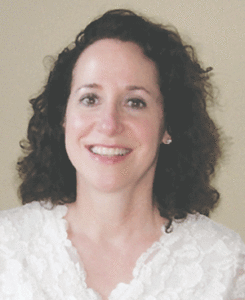Rabbi Julie Gordon, a Minnesota native, found herself in the midst of a threatening mob of ultra-Orthodox Jews
AJW Staff Report
Early in the morning on Friday, May 10, thousands of haredi Orthodox youths gathered at the Kotel, the Western Wall plaza, to protest Women of the Wall as they held their Rosh Chodesh prayer service.
As Women of the Wall (WOW), a women’s prayer group that holds monthly services at the site, began praying, the crowd of young haredim began to raise a ruckus. The protesters shouted obscenities, spit, and tossed bottles and rocks at the mostly female prayer group, which had been forced to the back of the plaza after haredi Orthodox women had packed the women’s section by the Wall earlier in the morning.
In an e-mail to the Jewish World this week, Rabbi Julie K. Gordon, formerly of Temple of Aaron Synagogue and the Talmud Torah of St. Paul, described how she prepared to lay tefillin — a ritual item handed down to her by her zayde — with the Women of the Wall group. May 10 also happened to be Gordon’s 56th birthday.
Davening with tefillin is something the rabbi does on a regular basis; however, “for the first time, I felt afraid,” she wrote.
Gordon described the scene at the Kotel: “It was painful to see some men throw rocks and hatefully yell, ‘Whore!’ and ‘Nazi’ and ‘You’re going to give us all cancer!’ and some women spit globs upon us, misunderstanding our sincerity.”
She added, “I made my way into the center of my women’s prayer group, WOW, wrapped myself in my brightly colored silk tallit that depicts the walls of the old city of Jerusalem, and laid my tefillin. Soon my fear melted with the rising joyous song and spirited Hallel prayers — psalms welcoming the month that brings Shavuot — our celebration of receiving the Torah at Sinai where we stood together as one people before God, each according to our own strengths and abilities. And limitations, I supposed, as the loud whistles and screams and obscenities meant to drown out our prayer rained upon us, harsher even than the rocks, coffee, trash and spit. The police were professional and effective, enforcing the court verdict allowing us to pray according to our pluralistic, feminist, and egalitarian customs, keeping the violence mostly at bay.”

Gordon referred to the decision in April by Jerusalem District Court Judge Moshe Sobol, who ruled that the group’s services do not violate the law and merit police protection rather than arrests. The May 10 WOW prayer service was the first time the group marked Rosh Chodesh since the court decision.
So on the morning of May 10, as Gordon noted, the police were on hand to protect the women, a reversal of scenes from months past, when women wearing prayer shawls to the monthly service would be arrested for breaking a law that banned any deviation from “local custom” at the Western Wall. Police arrested three haredi protesters, and a police spokesman said more arrests may be in the offing as police review video.
One day before the service, Rabbi Aharon Leib Shteynman, a haredi leader, called on thousands of students to protest Women of the Wall.
Jerusalem police officials fear that an even larger crowd of haredi protesters will assemble on June 9, when Women of the Wall will return to the Kotel to mark the start of the Jewish month of Tammuz, according to the Jewish Week of New York. The newspaper also reported that WOW leader Anat Hoffman fears that the Israeli government may push legislation to ban egalitarian prayer at the Western Wall. Hoffman vowed that her group would respond with civil disobedience.
“If they want to legislate that it’s illegal to read the Torah at the Wall, I think we’re all going to want to go to jail,” she told the Jewish Week.
Women of the Wall’s service has rarely, if ever, seen as many people come to protest as occurred on May 10. Many of the haredim said that they were there to pray, as many Jews do daily at the wall.

“I came to pray and to protest gentiles who masquerade as Jews,” said Pini, 17, from Jerusalem, who would not give his last name. “I’ve taken hits here and I’ll take more hits. They’re making the Torah crooked. They want us to be like them.”
Natan Sharansky, the chairman of the Jewish Agency who has been endeavoring to broker a modus vivendi at the wall by expanding the prayer area, said the events underscored the need for a compromise. In a statement he described an “urgent need” for a solution that would “allow any Jew, group of Jews or Jewish community to pray at the Western Wall according to their own custom.”
Amidst the chaotic events on May 10, Gordon wrote, “I focused my mind and spirit toward prayer, toward God’s love. And recalling that moment at Sinai, joined hearts with my people, including the vast majority of our ultra-Orthodox sisters and brothers who, like us, peacefully prayed to God seeking God’s strength and wisdom to make our world a better place.”
(Ben Sales, JTA’s correspondent in Israel, contributed to this report.)
(American Jewish World, 5.24.13)



















